英语四六级完形填空模拟题大全(7)
四六级考试完形填空练习
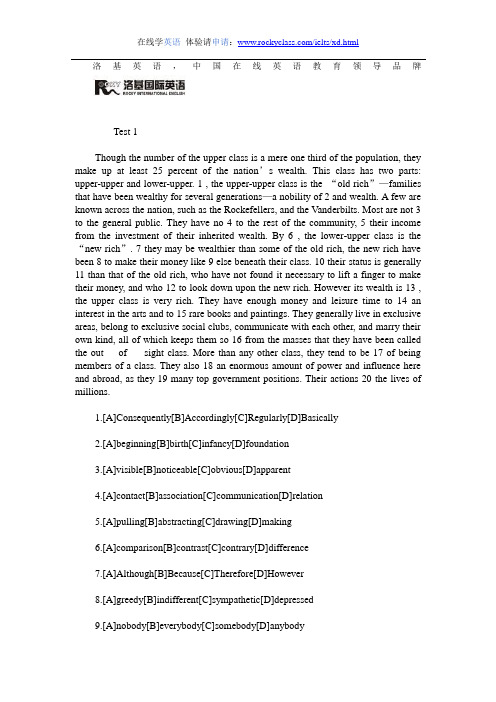
洛基英语,中国在线英语教育领导品牌Test 1Though the number of the upper class is a mere one third of the population, they make up at least 25 percent of the nation’s wealth. This class has two parts: upper-upper and lower-upper. 1 , the upper-upper class is the “old rich”—families that have been wealthy for several generations—a nobility of 2 and wealth. A few are known across the nation, such as the Rockefellers, and the Vanderbilts. Most are not 3 to the general public. They have no 4 to the rest of the community, 5 their income from the investment of their inherited wealth. By 6 , the lower-upper class is the “new rich”. 7 they may be wealthier than some of the old rich, the new rich have been 8 to make their money like 9 else beneath their class. 10 their status is generally 11 than that of the old rich, who have not found it necessary to lift a finger to make their money, and who 12 to look down upon the new rich. However its wealth is 13 , the upper class is very rich. They have enough money and leisure time to 14 an interest in the arts and to 15 rare books and paintings. They generally live in exclusive areas, belong to exclusive social clubs, communicate with each other, and marry their own kind, all of which keeps them so 16 from the masses that they have been called the out of sight class. More than any other class, they tend to be 17 of being members of a class. They also 18 an enormous amount of power and influence here and abroad, as they 19 many top government positions. Their actions 20 the lives of millions.1.[A]Consequently[B]Accordingly[C]Regularly[D]Basically2.[A]beginning[B]birth[C]infancy[D]foundation3.[A]visible[B]noticeable[C]obvious[D]apparent4.[A]contact[B]association[C]communication[D]relation5.[A]pulling[B]abstracting[C]drawing[D]making6.[A]comparison[B]contrast[C]contrary[D]difference7.[A]Although[B]Because[C]Therefore[D]However8.[A]greedy[B]indifferent[C]sympathetic[D]depressed9.[A]nobody[B]everybody[C]somebody[D]anybody10.[A]Then[B]But[C]Thus[D]Whereas11.[A]superior[B]inferior[C]higher[D]lower12.[A]want[B]select[C]hate[D]tend13.[A]retained[B]benefited[C]acquired[D]rewarded14.[A]reproduce[B]yield[C]cultivate[D]rear15.[A]collect[B]gather[C]assemble[D]accumulate16.[A]distant[B]far[C]separate[D]remote17.[A]doubtful[B]conscious[C]sensitive[D]sensible18.[A]demand[B]control[C]direct[D]command19.[A]seize[B]abuse[C]hold[D]sustain20.[A]attract[B]affect[C]effect[D]incline“成千上万人疯狂下载。
英语四级完形填空及解析
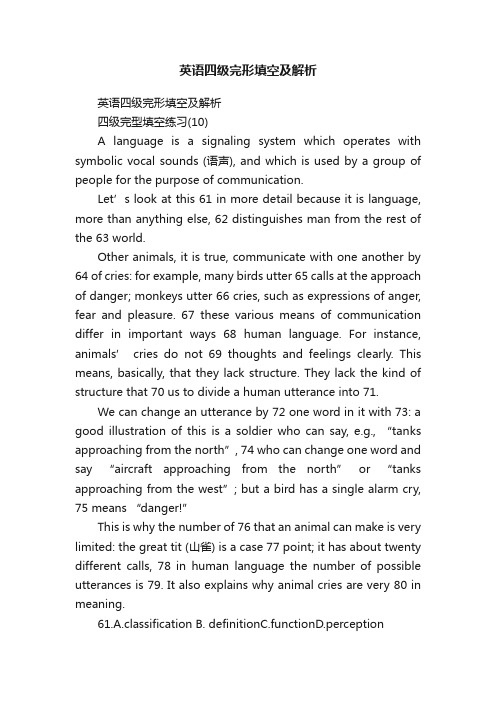
英语四级完形填空及解析英语四级完形填空及解析四级完型填空练习(10)A language is a signaling system which operates with symbolic vocal sounds (语声), and which is used by a group of people for the purpose of communication.Let’s look at this 61 in more detail because it is language, more than anything else, 62 distinguishes man from the rest of the 63 world.Other animals, it is true, communicate with one another by 64 of cries: for example, many birds utter 65 calls at the approach of danger; monkeys utter 66 cries, such as expressions of anger, fear and pleasure. 67 these various means of communication differ in important ways 68 human language. For instance, animals’ cries do not 69 thoughts and feelings cle arly. This means, basically, that they lack structure. They lack the kind of structure that 70 us to divide a human utterance into 71.We can change an utterance by 72 one word in it with 73: a good illustration of this is a soldier who can say, e.g., “tan ks approaching from the north”, 74 who can change one word and say “aircraft approaching from the north” or “tanks approaching from the west”; but a bird has a single alarm cry, 75 means “danger!”This is why the number of 76 that an animal can make is very limited: the great tit (山雀) is a case 77 point; it has about twenty different calls, 78 in human language the number of possible utterances is 79. It also explains why animal cries are very 80 in meaning.61.A.classification B. definitionC.functionD.perception62.A.that B. itC.asD.what63.A.native B. humanC. physicalD. animal64.A.ways B. meansC. methodsD. approaches65.A.mating B. excitingC. warningD. boring66.A.identical B. similarC. differentD. unfamiliar67.A.But B.ThereforeC. AfterwardsD. Furthermore68.A.about B. withC. fromD. in69.A.infer B. explainC. interpretD. express70.A. encourages B. enablesC. enforcesD. ensures71.A.speeches B. soundsC. wordsD.voices72.A. replacingB. spellingC. pronouncingD.saying73.A.ours B. theirsC. anotherD. others74.A.so B. andC. butD.or75.A.this B.thatC.whichD.it76.A.signs B.gesturesC.signalsD.marks77.A.in B.atC. ofD.for78.A.whereas B. sinceC. anyhowD.somehow79.A.boundless B. changeableC. limitlessD. ceaseless80.A.ordinary B. alikeC. commonD. general【答案】:61.B 62.C 63.C 64.B 65.C66.C 67.A 68.C 69.D 70.B71.C 72.A 73.C 74.B 75.C76.C 77.A 78.A 79.C 80.B【答案解析】:61.B 此题考查普通词汇。
全国英语六级考试完形填空基础训练附答案
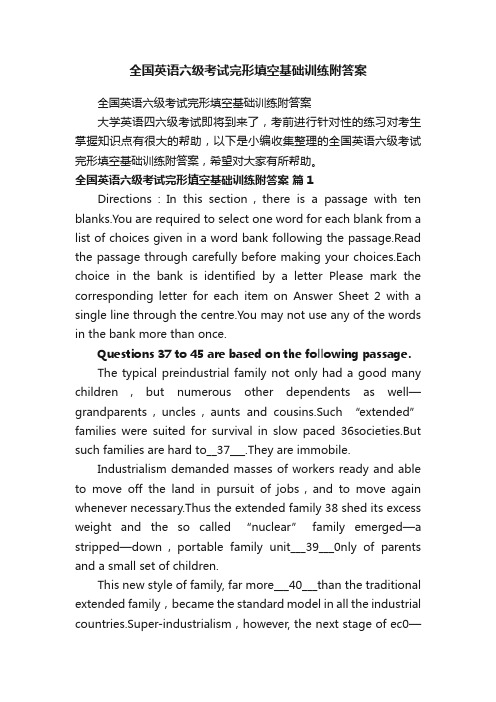
全国英语六级考试完形填空基础训练附答案全国英语六级考试完形填空基础训练附答案大学英语四六级考试即将到来了,考前进行针对性的练习对考生掌握知识点有很大的帮助,以下是小编收集整理的全国英语六级考试完形填空基础训练附答案,希望对大家有所帮助。
全国英语六级考试完形填空基础训练附答案篇1Directions:In this section,there is a passage with ten blanks.You are required to select one word for each blank from a list of choices given in a word bank following the passage.Read the passage through carefully before making your choices.Each choice in the bank is identified by a letter Please mark the corresponding letter for each item on Answer Sheet 2 with a single line through the centre.You may not use any of the words in the bank more than once.Questions 37 to 45 are based on the following passage.The typical preindustrial family not only had a good many children,but numerous other dependents as well—grandparents,uncles,aunts and cousins.Such “extended” families were suited for survival in slow paced 36societies.But such families are hard to__37___.They are immobile.Industrialism demanded masses of workers ready and able to move off the land in pursuit of jobs,and to move again whenever necessary.Thus the extended family 38 shed its excess weight and the so called “nuclear” family emerged—a stripped—down,portable family unit___39___0nly of parents and a small set of children.This new style of family, far more___40___than the traditional extended family,became the standard model in all the industrial countries.Super-industrialism,however, the next stage of ec0—technological development,___41___ even higher mobility.Thus we may expect many among the people of the future to carry the streamlining process,a step further by remaining children,cutting the family down to its more___42___components,a man and a woman.Two people,perhaps with matched careers,will prove more efficient at navigating through education and social status,through job changes and geographic relocations,than the ordinarily child—cluttered family.A___43___maybe the postponement of children,rather than childlessness.Men and women today are often torn in___44___between a commitment to career and a commitment to children.In the future,many___45___will side aside this problem by deferring the entire task of raising children until after retirement.参考答案36.【解析】J。
大学英语四六级考试备考-四级完形填空模拟题大全
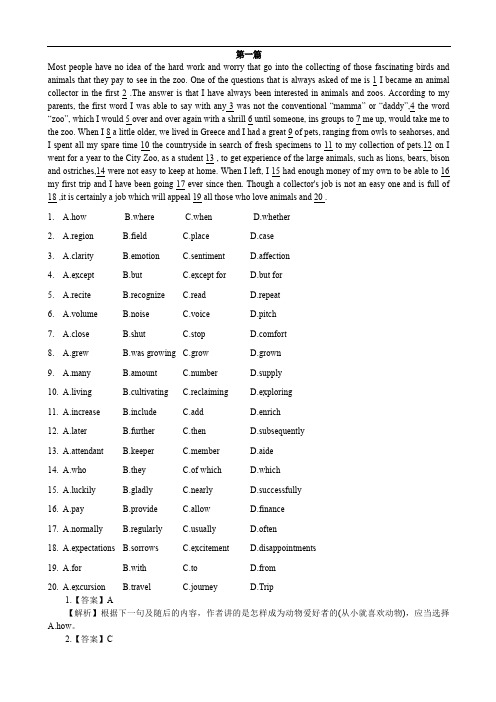
第一篇Most people have no idea of the hard work and worry that go into the collecting of those fascinating birds and animals that they pay to see in the zoo. One of the questions that is always asked of me is 1 I became an animal collector in the first 2 .The answer is that I have always been interested in animals and zoos. According to my parents, the first word I was able to say with any 3 was not the conventional “mamma” or “daddy”,4 the word “zoo”, which I would 5 over and over again with a shrill 6 until someone, ins groups to 7 me up, would take me to the zoo. When I 8 a little older, we lived in Greece and I had a great 9 of pets, ranging from owls to seahorses, and I spent all my spare time 10 the countryside in search of fresh specimens to 11 to my collection of pets.12 on I went for a year to the City Zoo, as a student 13 , to get experience of the large animals, such as lions, bears, bison and ostriches,14 were not easy to keep at home. When I left, I 15 had enough money of my own to be able to 16 my first trip and I have been going 17 ever since then. Though a collector's job is not an easy one and is full of 18 ,it is certainly a job which will appeal 19 all those who love animals and 20 .1. A.how B.where C.when D.whether2. A.region B.field C.place D.case3. A.clarity B.emotion C.sentiment D.affection4. A.except B.but C.except for D.but for5. A.recite B.recognize C.read D.repeat6. A.volume B.noise C.voice D.pitch7. A.close B.shut C.stop fort8. A.grew B.was growing C.grow D.grown9. A.many B.amount C.number D.supply10. A.living B.cultivating C.reclaiming D.exploring11. A.increase B.include C.add D.enrich12. ter B.further C.then D.subsequently13. A.attendant B.keeper C.member D.aide14. A.who B.they C.of which D.which15. A.luckily B.gladly C.nearly D.successfully16. A.pay B.provide C.allow D.finance17. A.normally B.regularly ually D.often18. A.expectations B.sorrows C.excitement D.disappointments19. A.for B.with C.to D.from20. A.excursion B.travel C.journey D.Trip1.【答案】A【解析】根据下一句及随后的内容,作者讲的是怎样成为动物爱好者的(从小就喜欢动物),应当选择A.how。
大学英语四六级考试_完型填空(cloze)专项训练
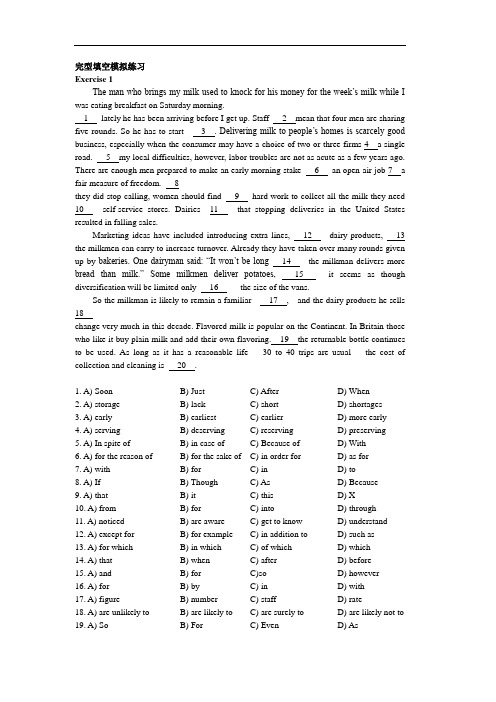
完型填空模拟练习Exercise 1The man who brings my milk used to knock for his money for the week’s milk while I was eating breakfast on Saturday morning.1lately he has been arriving before I get up. Staff 2mean that four men are sharing five rounds. So he has to start 3. Delivering milk to people’s homes is scarcely good business, especially when the consumer may have a choice of two or three firms 4 a single road. 5my local difficulties, however, labor troubles are not as acute as a few years ago. There are enough men prepared to make an early morning stake 6an open-air job 7 a fair measure of freedom. 8they did stop calling, women should find 9hard work to collect all the milk they need 10self-service stores. Dairies 11that stopping deliveries in the United States resulted in falling sales.Marketing ideas have included introducing extra lines, 12dairy products, 13 the milkmen can carry to increase turnover. Already they have taken over many rounds given up by bakeries. One dairyman said: “It won’t be long 14the milkman delivers more bread than milk.” Some milkmen deliver potatoes, 15it seems as though diversification will be limited only 16the size of the vans.So the milkman is likely to remain a familiar 17, and the dairy products he sells 18change very much in this decade. Flavored milk is popular on the Continent. In Britain those who like it buy plain milk and add their own flavoring.19the returnable bottle continues to be used. As long as it has a reasonable life-----30 to 40 trips are usual-----the cost of collection and cleaning is 20.1. A) Soon B) Just C) After D) When2. A) storage B) lack C) short D) shortages3. A) early B) earliest C) earlier D) more early4. A) serving B) deserving C) reserving D) preserving5. A) In spite of B) in case of C) Because of D) With6. A) for the reason of B) for the sake of C) in order for D) as for7. A) with B) for C) in D) to8. A) If B) Though C) As D) Because9. A) that B) it C) this D) X10. A) from B) for C) into D) through11. A) noticed B) are aware C) get to know D) understand12. A) except for B) for example C) in addition to D) such as13. A) for which B) in which C) of which D) which14. A) that B) when C) after D) before15. A) and B) for C)so D) however16. A) for B) by C) in D) with17. A) figure B) number C) staff D) rate18. A) are unlikely to B) are likely to C) are surely to D) are likely not to19. A) So B) For C) Even D) As20. A) worthy B) worthwhile C) worthless D) worthExercise 2A land free from destruction, plus wealth, natural resources, and labor supply ——all these were important 1in helping England to become the center for the Industrial Revolution. 2they were not enough. Something 3 was needed to start the industrial process. That “something special” was men4individuals who could invent machines, find new5of power, and establish business organizations to reshape society.The men who6the machines of the Industrial Revolution 7from many backgrounds and many occupations. Many of them were8inventors than scientists. A man who is a 9scientist is primarily interested in doing his research 10. He is not necessarily working 11that his findings can be used.An inventor of one interested in applied science is 12trying to make something that has a concrete 13. He may try to solve a problem by singing the theories 14 science or experimenting through trial and error. Regardless of his method, he is working to obtain a 15result: the construction of a harvesting machine, the burning of a light bulb, or one of 16other objectives.Most of people who 17the machines of the Industrial Revolution were inventors, not trained scientists. A few were both scientists and inventors. Even those who had 18or no training in science might not have made their inventions 19 a groundwork had not been laid by scientists years20.1. A) cases B) reasons C) factors D) situations2. A) But B) And C) Besides D) Even3. A) else B) near C) extra D) similar4. A) generating B) effective C) motivating D) creative5. A) origins B) sources C) bases D) discoveries6. A) employed B) created C) operated D) controlled7. A) came B) arrived C) stemmed D) appeared8. A) less B) better C) more D) worse9. A) genuine B) practical C) pure D) clever10. A) happily B) occasionally C) reluctantly D) accurately11. A) now B) and C) all D) so12. A) seldom B) sometimes C) usually D) never13. A) plan B) use C) idea D) means14. A) of B) with C) to D) as15. A) single B) sole C) specialized D) specific16. A) few B) those C) many D) all17. A) proposed B) developed C) supplied D) offered18. A) little B) much C) some D) any19. A) as B) if C) because D) while20. A) ago B) past C) ahead D)beforeExercise 3The last tunnel across the English channel is reported to have been linked at the end of June, 1991. Thus, the long-expected Eurotunnel will soon be open 1public. Before long, one will be able to travel from London to Paris 2 3.5 hours.Until recently, the English Channel was3by the British as their last-ditch defence 4their enemies. It was not until after World War Ⅱ5the British began to 6the importance of an all-weather link 7the outside world. 8there is still a psychological 9that stands between the British public and a bridge 10this particular stretch of water. Some people think that it’s going to have 11disadvantages than advantages. For example, the British have 12to control the spread of rabies (狂犬病). They are afraid that Eurotunnel will 13back this terrible disease. Some people 14that the opening of the tunnel will 15Britain into a smuggler’s paradise. Others 16that the vast construction of the tunnel will 17the quiet greenery of the Knet countryside.18all these objections, the desire 19 a closer link with the 20and the entire world is irresistible. Most people believe that the tunnel will be good for Britain.1. A) for B) into C) to D) towards2. A) in B) for C) with D) within3. A) considered B) organized C) served D) turned4. A) against B) towards C) around D) beyond5. A) that B) which C) when D) and6. A) confirm B) realize C) define D) restrict7. A) over B) through C) in D) with8. A) Therefore B) Moreover C) Besides D) Yet9. A) block B) lock C) jam D) tie10. A) above B) across C) on D) up11. A) rather B) much C) many D) more12. A) planned B) developed C) managed D) succeeded13. A) return B) come C) bring D) get14. A) afraid B) fear C) frighten D) threaten15. A) plunge B) put C) turn D) set16. A) argue B) quarrel C) inquire D) judge17. A) collapse B) destroy C) impact D) grind18.A) In addition to B) Despite C) Regardless D) But for19. A) of B) for C) concerning D) around20. A) land B) country C) continent D) peopleExercise 4How did music begin? Scholars differ about the 1of music. Early man probably 2 to use his voice for singing before he discovered how to make musical instruments. Very 3 he sang simple chants to go with his magic rites. (Through magic, primitive man thought he could bring rain, make the sun 4or help his crops grow.) Thus the first melodies were born.Man soon learned how to make musical instruments out of 5he found around him.He made rattles out of nuts and gourds. He blew into bones or reeds to make a 6sound. Hollow logs made excellent drums. These instruments heightened the 7man’s singing and marked the rhythm of his dances.When primitive men sang8groups, it is likely that not all the singers sang the melodies on the same 9. One singer perhaps sang his melody four or five steps higher than 10. If two or three singers 11this, several notes were sounded at the same time. Thus early man probably 12the beginnings of harmony, the sounding of several tones together.13 a very long time music was not written down. It was sung or 14from memory. One singer might teach a song or others, and they 15would sing it to their friends or teach it to their children. Of course, many changes 16into tunes this way. Man needed to find a way of writing his music down, so that it would be sung or played exactly as he had17 it. The method that man developed for writing music is called notation.Musical notation, like written language, is a 18of communication. It enables the composer to record his music in written symbols. Musicians can read these symbols and the composer’s id eas to 19in sound, thus 20them to the listener.1. A) source B) origin C) appearance D) background2. A) learned B) chose C) trained D) happened3. A) much B) hard C) likely D) well4. A) shine B) shining C) shone D) to shine5. A) samples B) patterns C) products D) things6. A) charming B) hissing C) whistling D) penetrating7. A) quality B) effect C) strength D) performance8. A) from B) by C) with D) in9. A) tune B) tone C) pitch D) rhythm10. A) other B) the other C) others D) the others11. A) did B) sang C) had D) made12. A) initiated B) experienced C) expected D) volunteered13. A) Before B) For C) Since D) Until14. A) played B) presented C) recorded D) recited15. A) in fact B) in case C) in general D) in turn16. A) crawled B) stole C) crept D) stamped17. A) devised B) composed C) imagined D) conceived18. A) means B) medium C) symbol D) signal19. A) image B) vision C) life D) reality20. A) producing B) interpreting C) transplanting D) communicatingExercise 5In a telephone survey of more than 2,000 adults, 21% said they believed the sun revolved around the earth. An 17% did not know which revolved around2. 3 I have no doubt that all of these people were4in school that the earth revolves around the sun; 5may even have written it 6 a test. But they never 7their incorrect mental models of planetary8because their everyday observation d idn’t support 9theirteachers told them: People see the sun “moving” 10the sky as morning turns to night, and the earth seems stationary 11that is happening.Students can learn the right answers 12heart in class, and yet never combined them 13their working models of the world. The objectively correct answer the professor accepts and the 14personal understanding of the world can 15side by side, each unaffected by the other.Outside of class, the student continues to use the 16model because it has always worked well17that circumstance. Unless professors address18errors in students’ personal models of the world, students are not 19to replace them with the 20one.1. A) excessive B) extra C) additional D) added2. A) what B) which C) that D) other3. A) Virtually B) Remarkably C) Ideally D) Preferably4. A) learned B) suggested C) taught D) advised5. A) those B) these C) who D) they6. A) on B) with C) under D) for7. A) formed B) altered C) believed D) thought8. A) operation B) position C) motion D) location9. A) how B) which C) that D) what10. A) around B) across C) on D) above11. A) since B) so C) while D) for12. A) to B) by C) in D) with13. A) with B) into C) to D) along14. A) adult’s B) teacher’s C) scientist’s D) stu dent’s15. A) exist B) occur C) survive D) maintain16. A) private B) individual C) personal D) own17. A) in B) with C) on D) for18. A) general B) natural C) similar D) specific19. A) obliged B) likely C) probable D) partial20. A) perfect B) better C) reasonable D) correctExercise 6In Japan most people still feel that a woman’s place is in the home; and most women willingly accept their1role as wife, leaving the business of making a living 2their husbands.For those who 3want a career of their own, opportunities are limited, and working women usually have to 4for lower wages, fewer promotions, less responsible 5. In American, on the other hand, most women, 6wives and mothers, work most of their lives.But 7, few have had real careers. As in Japan most fields are 8by men and opportunities for women have been 9, salaries low, chances for advancement 10.American women work mainly because they 11; in these days of inflation and luxurious living, 12income per family is simply not enough to 13.So American women actually have two jobs; one nine to five position outside the home, and 14round-the-clock in-the-home job 15wife, housemaid, cook, and nurse. One of the main goals of the modern women’s liberation movement, which started 16 was to eliminate sex discrimination in the work force, and to 17careers for women that were previously 18for men. And though there is still a long way to 19, a lot of progress has been 20.1. A) conservative B) traditional C) usual D) unhappy2. A) for B) to C) with D) away with3. A) very B) truly C) do D) indeed4. A) settle B) ask C) request D) search5. A) titles B) assignments C) status D) positions6. A) concerning B) containing C) including D) involving7. A) at present B) recently C) until recently D) not until recently8. A) owned B) led C) kept D) dominated9. A) restricted B) reduced C) bounded D) prohibited10. A) small B) rare C) inadequate D) scarce11. A) should B) like C) ought D) have to12. A) one B) only C) single D) the one13. A) live B) feed on C) live on D) support14. A) another B) other C) one D) the other15. A) such as B) as B) like D) acting16. A) in the early 1960s B) early in the 1960C) in early the 1960s D) in the early 196017. A) lead to B) offer C) open up D) set up18. A) preserved B) concerned C) observed D) reserved19. A) go B) strive C) travel D) pull through20. A) made B) covered C) taken D) completedExercise 7A major reason for 1in the animal world is territory. The male animal establishes an area. The size of the area is sufficient to provide food for him, his wife and their 2. Migrating birds, for example, dividing up the best territory 3the order of “ first come, first served.” The late arrivals may acquire 4territories. 5less food is available, or they are too close to the 6of the enemies of the species. If there is really 7food or the danger is very great, the animal will not 8.In this way, the member of species which are less fit 9have offspringWhen there is conflict 10territory, animal will 11use force, or 12 of force, to decide which will stay and which will go. It is interesting to note, 13that animals seem to use 14the minimum amount of force 15to drive away the intruder. There is 16killing.In the 17of those animals which are capable of doing each other great harm, 18is a system for the losing animal to show his willingness that he wishes to submit. When he shows this, the 19normally stops fighting. Animals ( especially birds), whichcan easily escape from conflict seem to have 20obstacle against killing, and equally no mechanism for submission. The losing bird simply flies away.1. A) fighting B) against C) conflict D) killing2. A) mates B) friends C) neighbors D) offspring3. A) in B) for C) about D) with4. A) smaller B) larger C) better D) worse5. A) so B) either C) but D) therefore6. A) caves B) houses C) habitats D) residence7. A) enough B) insufficient C) delicious D) ordinary8. A) compete B) eat C) breed D) mate9. A) may B) must C) will not D) should10.A) for B) with C) over D) to11. A) certainly B) commonly C) really D) practically12. A) a show B) an amount C) an act D) a comparison13. A) though B) however C) as a result D) as it is14. A) only B) largely C) mainly D) undoubtedly15. A) essential B) vital C) necessary D) compulsory16. A) usually much B) occasionally C) usually no D) inevitable17. A) case B) event C) manner D) way18. A) this B) that C) it D) there19. A) loser B) victor C) successor D) killer20. A) any B) some C) every D) no.Exercise 8In the next 40 years, the percentage of people in the United States over the age of 65 is expected to double. 1the needs of this part of the population is a 2to the ingenuity of America. To a 3degree, a society is judged by 4it cares for those who can no 5care for themselves.High technology 6the most startling advances in helping the elderly. In 7to the well-known artificial heart implantation, there are efforts underway to 8artificial lungs, livers, and bones. An electric ear is 9seventy-five percent effective. They will 10better medical care by 11minute doses of drugs into the body continuously.For the older people, even the simplest tasks can be difficult, 12impossible to perform. American business have responded 13their needs with a 14of inexpensive but useful 15.Companies have designed extra-efficient can openers that 16people whose hands have become 17weak to open cans easily. There are devices that allow people to pull on a pair of socks 18straining their backs. Combs with long handles and U-shaped back brushes are 19for those who can not reach as far as they could 20they were young.1. A) Seeing B) Meeting C) Facing D) Matching2. A) chance B) challenge C) call D) interference3. A) valuable B) comprehension C) considerate D) considerable4. A) how B) why C) what D) whom5. A) doubt B) sooner C) wonder D) longer6. A) protects B) profits C) proclaims D) promises7. A) relation B) contrast C) addition D) proportion8. A) discover B) promote C) assemble D) develop9. A) thus B) still C) already D) yet10. A) permit B) persist C) serve D) pursue11. A) removing B) releasing C) relieving D) replacing12. A) always B) usually C) eventually D) sometimes13. A) to B) at C) with D) on14. A) set B) variety C) series D) group15. A) production B) produce C) products D) sales16. A) enable B) make C) cause D) encourage17. A) so B) very C) too D) rather18. A) by B) without C) in D) for19. A) valuable B) ready C) near D) available20. A) if B) unless C) when D) sinExercise 9Shopping habits in the United States have changed greatly in the last quarter of the 20th century.1in the 1900s most American towns and cities had a Main Street. Main Street was always in the heart of a town. This street was 2on both sides with many 3 businesses.Here, shoppers walked into stores to look at all sorts of merchandise: clothing, furniture, hardware, groceries. 4, some shops offered 5. These shops included drugstores, restaurants, shoe repair stores, and barber or hairdressing shops.6in the 1950s, a change began to 7. Too many automobiles had crowded into Main Street 8too few parking places were 9shoppers.Because the streets were crowded, merchants began to look with interest at the open spaces 10the city limits. Open space is what their car driving customers needed. And open space is what they got 11the first shopping centre was built. Shopping centers, or rather malls, 12as a collection of small new stores 13crowded city centers.14by hundreds of free parking space, customers were drawn away from 15areas to outlying malls. And the growing 16of shopping centers led 17to the building of bigger and better stocked stores. 18the late 1970s, many shopping malls had almost developed into small cities themselves.In addition to providing the 19of one stop shopping, malls were transformed into landscaped parks, 20benches, fountains, and outdoor entertainment.1. A) As early as B) Early C) Early as D) Earlier2. A) built B) designed C) intended D) lined3. A) varied B) various C) sorted D) mixed up4. A) Apart from B) However C) In addition D) As well5. A) medical care B) food C) cosmetics D) serves6. A) Suddenly B) Abruptly C) Contrarily D) But7. A) be taking place B) take placeC) be taken place D) have taken place8. A) while B) yet C) though D) and then9. A) available for B) available to C) used by D) ready for10. A) over B) from C) out of D) outside11. A) when B) while C) since D) then12. A) started B) founded C) set up D) organized13. A) out of B) away from C) next to D) near14. A) Attracted B) Surprised C) Delighted D) Enjoyed15. A) inner B) central C) shopping D) downtown16. A) distinction B) fame C) popularity D) liking17. A) on B) in turn C) by turns D) further18. A) By B) During C) In D) Towards19. A) cheapness B) readiness C) convenience D) handiness20. A) because of B) and C) with D) providedExercise 10Yes, but what did we 1to do before there was television? How2we hear statements like this! Television hasn’t been with us all 3long, but we are already beginning to forget what the world was4without it. Before we admitted the one-eyed monster (怪物)into our homes, we never 5it difficult to 6our spare time. We used to enjoy civilized pleasures. For instance, we used to have hobbies, we used to 7 our friends and be entertained by them, we used to go outside for our amusements to theatres, cinemas, restaurants and sporting 8. We even used to read books and listen to music and broadcast talks occasionally. All that 9to the past. Now all our free time is regulated by the goggle box(电视机). We rush home or gulp down our meals to be 10 for this or that program. We have even 11sitting at table and having a leisurely evening meal, 12the news of the day. A sandwich and a glass of beer will 13– anything, providing it doesn’t 14with the program. The monster demands and obtains absolute silence and 15 . If any member of the family dares to open his mouth during a program, he is quickly 16.Whole generations are growing up 17to the TV. Food is left uneaten, homework undone and sleep is lost. The TV is a universal pacifier(抚慰者). It is now standard 18 for mother to keep the children quiet by putting them in the living-room and turning on the set. It doesn’t 19that the children will watch rubbishy commercials or spectacles of violence –20they are quiet.1. A) used B) use C) do D) have2. A) much B) likely C) often D) long3. A) that B) too C) these D) such4. A) alike B) like C) likely D) likened5. A) see B) took C) found D) had6. A) occupy B) take C) cost D) get7. A) amuse B) relax C) entertain D) treat8. A) incidents B) events C) games D) programs9. A) belongs B) is C) goes D) turns10. A) in time B) on time C) catch time D) timing11. A) given in B) given off C) given out D) given up12. A) changing B) exchanging C) communicating D) watching13. A) do B) function C) work out D) serve14. A) go B) trouble C) interfere D) annoy15. A) help B) attention C) success D) knowledge16. A) silent B) silenced C) silence D) quiet17. A) relying B) dependent C) addicted D) drawn18. A) thing B) practice C) matter D) action19. A) count B) matter C) bother D) hurt20. A) so long as B) until C) because D) whenExercise 11Increased 1increases the need for natural resources and also increases 2 produce. Making a new useful product 3 a waste product decreases our need for 4 resources. Recycling means using something over 5after it has been use once. This is supposed to be a popular practice within ten years.Have you ever seen a piece of 6paper? About 7of all the paper products made each year are made from waste paper. For example, recycled paper is usually used to make paper sacks. Recycling paper, 8newspapers,9the number of trees that must be cut each year to make newspapers.Each person 10 a lot of solid waste every day. In the United States, the 11 is eight kilograms of waste per person each day. 12the waste is garbage and trash. Finding places to dispose solid wastes is a 13problem.In many cities wastes are 14and the trash part is burned in incinerator(焚烧) plants. Air pollution15devices are used to prevent pollution. Heat produced in the burning may be used to 16electricity. Waste that is not combustible(易燃的)is taken to a 17 dump. One kind of dump for the disposal 18solid wastes is a sanitary landfill (废渣填埋池). This method 19 burying the wastes and covering soil over them. Parks, baseball fields, airports, and other 20may be built on completely filled landfills (垃圾掩埋场).1. A) populace B) population C) populous D) people2. A) rubbish B) junk C) waste D) refuse3. A) out of B) in C) to D) for4. A) national B) natural C) artificial D) genuine5. A) once B) repeatedly C) again D) shortly6. A) recycling B) recycled C) recycle D) renewed7. A) one third B) one three C) third firsts D) first three8. A) namely B) such as C) for example D) etc.9. A) reduces B) drops C) slows D) loosens10. A) make B) produces C) gives D) turns11. A) common B) average C) total D) amount12. A) Mostly B) Almost C) Most of D) Totally13. A) imperative B) major C) great D) harsh14. A) turned B) assembled C) collected D) finished15. A) control B) controlling C) controlled D) management16. A) give B) generate C) send D) take17. A) near B) far C) distant D) front18. A) to B) with C) in D) of19. A) takes B) evolves C) involves D) revolves20. A) stories B) theaters C) developments D) schoolsExercise 12Shyness is the 1of much unhappiness for a great many people. Shy people are anxious and self-conscious; that is, they are excessively 2with their own appearance and 3. Worrisome thoughts are constantly 4in their minds: What kind of impression am I making? Do they like me? Do I sound stupid? Am I wearing 5clothes?It is obvious that such uncomfortable feelings must 6people adversely. A person’s self-concept is 7in the way he or she behaves, and the way a person behaves affects other people’s reactions. 8,the way people think about themselves has a profound effect on all areas of their lives.Shy people, having 9self-esteem (尊重), are likely to be passive and easily influenced by oth ers. They need reassurance that they are doing “the right thing.” Shy people are very sensitive 10criticism; they feel it 11their inferiority. They also find it difficult to be pleased by compliments (恭维) because they believe they are 12of praise.A shy person may respond to a compliment with a 13like this one: “You’re just saying that to make me feel good. I know it’s not true.” It is clear that, while self-awareness is a healthy quality, 14it is harmful.Can shyness be completely eliminated, or at least 15? Fortunately, people can 16 shyness with determined and patient effort in building self-confidence. Since shyness goes 17with lack of self-esteem, it is important for people to accept their weaknesses as well as their 18. For example, most people would like to be “A” students in every subject. It is not fair for them to label themselves 19because they have difficulty in some areas. People’s expectations of themselves must be 20. Living on the impossible leads to a sense of inadequacy.1. A) base B) basis C) cause D) reason2. A) worried B) concerned C) surprised D) amused3. A) acts B) actions C) style D) deeds4. A) taking place B) ringing C) occurring D) striking5. A) magnificent B) appealing C) fun D) unattractive6. A) effect B) interfere C) affect D) turn7. A) reacted B) replied C) reflected D) responded8. A) In general B) Furthermore C) However D) Nevertheless9. A) high B) low C) medium D) no10. A) about B) against C) at D) for11. A) gives B) makes C) confirms D) generate12. A) worthy B) unworthy C) deserving D) aware13. A) word B) sentence C) statement D) announcement14. A) undertaking B) overdoing C) exercising D) trying15. A) dropped B) reduced C) abandoned D) abided16. A) get B) handle C) dispose D) overcome17. A) hand in hand B) next C) after D) short of18. A) advantages B) strengths C) flaws D) length19. A) low B) inferior C) bad D) disabled20. A) true B) real C) realistic D) genuineExercise 11. 【分析】答案Bjust 表示“只是”,作副词修饰lately。
小学四六级英语试题及答案
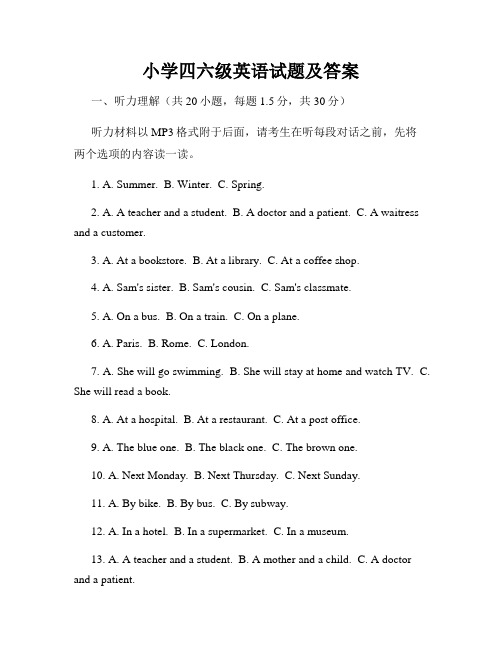
小学四六级英语试题及答案一、听力理解(共20小题,每题1.5分,共30分)听力材料以MP3格式附于后面,请考生在听每段对话之前,先将两个选项的内容读一读。
1. A. Summer. B. Winter. C. Spring.2. A. A teacher and a student. B. A doctor and a patient. C. A waitress and a customer.3. A. At a bookstore. B. At a library. C. At a coffee shop.4. A. Sam's sister. B. Sam's cousin. C. Sam's classmate.5. A. On a bus. B. On a train. C. On a plane.6. A. Paris. B. Rome. C. London.7. A. She will go swimming. B. She will stay at home and watch TV. C. She will read a book.8. A. At a hospital. B. At a restaurant. C. At a post office.9. A. The blue one. B. The black one. C. The brown one.10. A. Next Monday. B. Next Thursday. C. Next Sunday.11. A. By bike. B. By bus. C. By subway.12. A. In a hotel. B. In a supermarket. C. In a museum.13. A. A teacher and a student. B. A mother and a child. C. A doctor and a patient.14. A. Reading a book. B. Watching a movie. C. Listening to music.15. A. He is happy. B. He is sad. C. He is angry.16. A. In a living room. B. In a kitchen. C. In a bedroom.17. A. She will take a bus. B. She will walk. C. She will take a taxi.18. A. A doctor and a patient. B. A teacher and a student. C. A father and a son.19. A. A doctor and a patient. B. A mother and a daughter. C. A teacher and a student.20. A. At a clothing store. B. At a shoe store. C. At a bookstore.二、词汇与语法(共30小题,每题1分,共30分)从A、B、C、D四个选项中选出一个可以填入空白处的最佳答案。
英语四级完形填空模拟考试习题
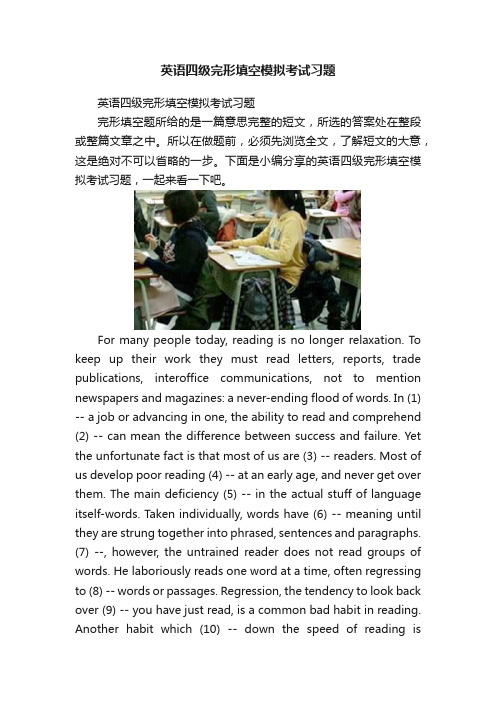
英语四级完形填空模拟考试习题英语四级完形填空模拟考试习题完形填空题所给的是一篇意思完整的短文,所选的答案处在整段或整篇文章之中。
所以在做题前,必须先浏览全文,了解短文的大意,这是绝对不可以省略的一步。
下面是小编分享的英语四级完形填空模拟考试习题,一起来看一下吧。
For many people today, reading is no longer relaxation. To keep up their work they must read letters, reports, trade publications, interoffice communications, not to mention newspapers and magazines: a never-ending flood of words. In (1) -- a job or advancing in one, the ability to read and comprehend (2) -- can mean the difference between success and failure. Yet the unfortunate fact is that most of us are (3) -- readers. Most of us develop poor reading (4) -- at an early age, and never get over them. The main deficiency (5) -- in the actual stuff of language itself-words. Taken individually, words have (6) -- meaning until they are strung together into phrased, sentences and paragraphs.(7) --, however, the untrained reader does not read groups of words. He laboriously reads one word at a time, often regressing to (8) -- words or passages. Regression, the tendency to look back over (9) -- you have just read, is a common bad habit in reading. Another habit which (10) -- down the speed of reading isvocalization - sounding each word either orally or mentally as (11) -- reads.To overcome these bad habits, some reading clinics use a device called an (12), which moves a bar (or curtain) down the page at a predetermined speed. The bar is set at a slightly faster rate (13) -- the reader finds comfortable, in order to “stretch”him. The accelerator forces the reader to read fast, (14) -- word-by-word reading, regression and subvocalization, practically impossible. At first (15) -- is sacrificed for speed. But when you learn to read ideas and concepts, you will not only read faster, (16) -- your comprehension will improve. Many people have found (17) -- reading skill drastically improved after some training. (18) -- Charlce Au, a business manager, for instance, his reading rate was a reasonably good 172 words a minute (19) -- the training, now it is an excellent 1,378 words a minute. He is delighted that how he can (20) -- a lot more reading material ina short period of time.1.A.applying B. doing C. offering D. getting2.A.quickly B. easily C. roughly D. decidedly3.A.good B. curious C. poor D. urgent4.A.training B. habits C. situations D. custom5.A.lies B. combines C. touches D. involves6.A.some B.A lot C. little D. dull7.A.Fortunately B. In fact C. Logically D. Unfortunately8.A.reuse B. reread C. rewrite D. recite9.A.what B. which C. that D. if10.A.scales B. cuts C. slows D. measures11.A.some one B. one C. he D. reader12.A.accelerator B. actor C. amplifier D. observer13.A.then B. as C. beyond D. than14.A.enabling B. leading C. making D. indicating15.A.meaning B. comprehension C. gist D. regression16.A.but B. nor C. or D. for17.A.our B. your C. their D. such a18.A.Look at B. Take C. Make D. Consider19.A.for B. in C. after D. before20.A.master B. go over C. present D. get throughCloze Test 41.D 【解析】本句意思是“谁如果想谋得一份差事”。
英语四六级试题(完形填空)连载_
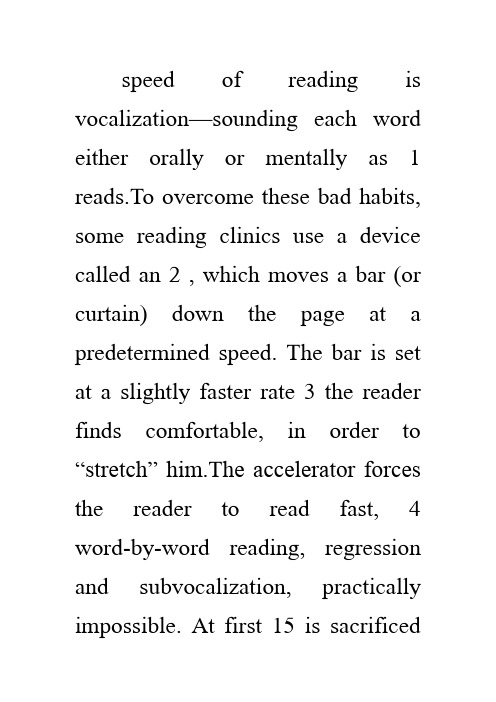
speed of reading is vocalization—sounding each word either orally or mentally as 1 reads.To overcome these bad habits, some reading clinics use a device called an 2 , which moves a bar (or curtain) down the page at a predetermined speed. The bar is set at a slightly faster rate 3 the reader finds comfortable, in order to “stretch” him.The accelerator forces the reader to read fast, 4 word-by-word reading, regression and subvocalization, practically impossible. At first 15 is sacrificedfor speed. But when you learn to read ideas and concepts, you will not only read faster, 6 your comprehension will improve. Many people have found 7 reading skill drastically improved after some training. 8 Charlce Au, a business manager, for instance, his reading rate was a reasonably good 172 words a minute 9 the training, now it is an excellent 1,378 words a minute. He is delighted that how he can 10 a lot more reading material in a short period of time.you would bring with you somebasic strengths and weaknesses. Success or 11 in your work would depend, to 12 great extent, 13 your ability to use your strengths and weaknesses to the best advantage. 14 the utmost importance is your attitude. A person 15 begins a job convinced that he isn't going to like it or is 16 that he is going to ail is exhibiting a weakness which can only hinder his success. On the other hand, a person who is secure 17 his belief that he is probably as capable 18 doing the work as anyone else and who is willing to make acheerful attempt 19 it possesses a certain strength of purpose. The chances are that he will do well。
四级英语完型填空模拟试题与解析
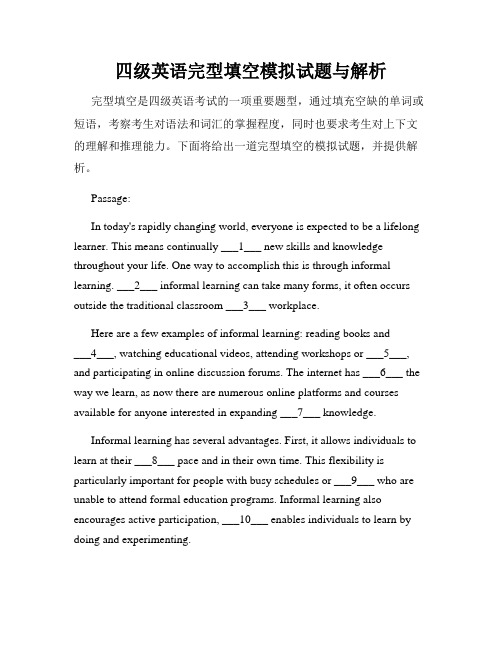
四级英语完型填空模拟试题与解析完型填空是四级英语考试的一项重要题型,通过填充空缺的单词或短语,考察考生对语法和词汇的掌握程度,同时也要求考生对上下文的理解和推理能力。
下面将给出一道完型填空的模拟试题,并提供解析。
Passage:In today's rapidly changing world, everyone is expected to be a lifelong learner. This means continually ___1___ new skills and knowledge throughout your life. One way to accomplish this is through informal learning. ___2___ informal learning can take many forms, it often occurs outside the traditional classroom ___3___ workplace.Here are a few examples of informal learning: reading books and___4___, watching educational videos, attending workshops or ___5___, and participating in online discussion forums. The internet has ___6___ the way we learn, as now there are numerous online platforms and courses available for anyone interested in expanding ___7___ knowledge.Informal learning has several advantages. First, it allows individuals to learn at their ___8___ pace and in their own time. This flexibility is particularly important for people with busy schedules or ___9___ who are unable to attend formal education programs. Informal learning also encourages active participation, ___10___ enables individuals to learn by doing and experimenting.In addition, informal learning can help individuals develop important___11___ such as critical thinking, problem-solving, and communication skills. By engaging in informal learning, ___12___ can gain knowledge and transferable skills that are applicable to various ___13___ of life, including their personal and professional ___14___.However, informal learning also has its ___15___. One challenge is the lack of structure and guidance, which can ___16___ individuals to become overwhelmed or lose motivation. Without a clear learning ___17___, it is easy to get distracted and lose focus. Additionally, informal learning___18___ the risk of misinformation, as not all sources or materials may be reliable or accurate.To make the most of informal learning, it is important to set goals, have a plan, and ___19___ yourself accountable. Seek out reputable sources and resources, and ___20___ to connect with others who have similar interests or goals.解析:1. A) expanding B) acquiring C) accumulating D) upgrading解析:选B) acquiring。
英语四六级试题(完形填空)连载
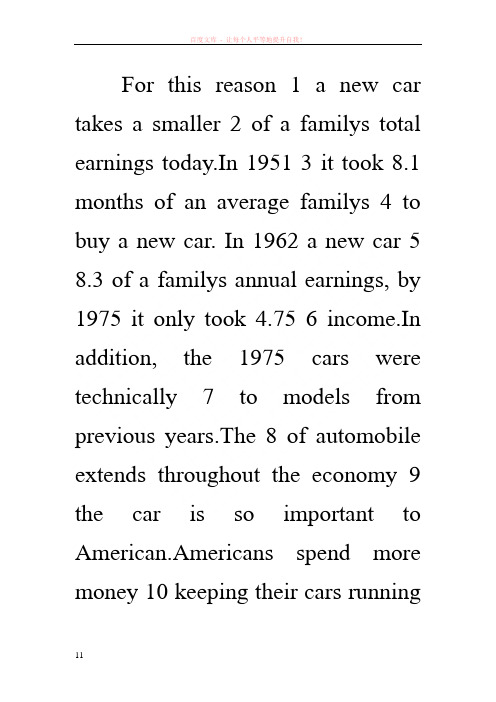
For this reason 1 a new car takes a smaller 2 of a familys total earnings today.In 1951 3 it took 8.1 months of an average familys 4 to buy a new car. In 1962 a new car 5 8.3 of a familys annual earnings, by 1975 it only took 4.75 6 income.In addition, the 1975 cars were technically 7 to models from previous years.The 8 of automobile extends throughout the economy 9 the car is so important to American.Americans spend more money 10 keeping their cars runningthan on any other item.strengths and weaknesses. Success or 11 in your work would depend, to 12 great extent, 13 your ability to use your strengths and weaknesses to the best advantage. 14 the utmost importance is your attitude. A person 15 begins a job convinced that he isn't going to like it or is 6 that he is going to ail is exhibiting a weakness which can only hinder his success. On the other hand, a person who is secure 17 his belief that he is probably as capable18 doing the work as anyone else and who is willing to make a cheerful attempt 19 it possesses a certain strength of purpose. The chances are that he will do well。
专四完形填空
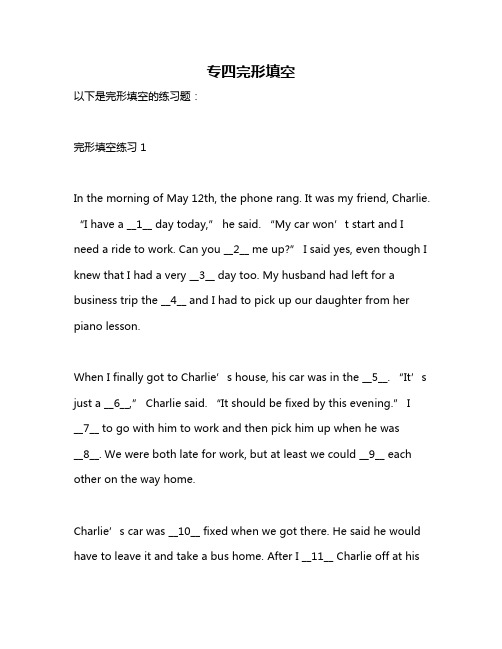
专四完形填空以下是完形填空的练习题:完形填空练习1In the morning of May 12th, the phone rang. It was my friend, Charlie. “I have a __1__ day today,” he said. “My car won’t start and I need a ride to work. Can you __2__ me up?” I said yes, even though I knew that I had a very __3__ day too. My husband had left for a business trip the __4__ and I had to pick up our daughter from her piano lesson.When I finally got to Charlie’s house, his car was in the __5__. “It’s just a __6__,” Charlie said. “It should be fixed by this evening.” I__7__ to go with him to work and then pick him up when he was__8__. We were both late for work, but at least we could __9__ each other on the way home.Charlie’s car was __10__ fixed when we got there. He said he would have to leave it and take a bus home. After I __11__ Charlie off at hisoffice, I went to pick up our daughter. She was __12__ and didn’t want to practice piano any more. “But you are so __13__ at it,” I said. “Don’t give up now.” She didn’t seem to __14__ what I said. She just wanted to go out and play.On my way home, I thought about what a __15__ day Charlie and I had. We both helped each other when we were in trouble. Charlie let me use his car and I __16__ him to his office. It made me feel good to know that we could rely on each other.When I got home, my husband had returned from his trip. “How was your day?” he asked. “Not __17__,” I said, “but it could be worse.” We had a lot to __18__ about, but at least we were all safe and sound. That night, when I __19__ down to bed, I thought about how lucky we were to have each other.The next morning, Charlie called and said his car was fixed. “You can __20__ me up again if you want,” he said. “No problem,” I said. “I’ll pick you up at 7:30.”1. A. bad B. terrible C. good D. fine2. A. wake B. call C. pick D. drop3. A. busy B. free C. lazy D. dull4. A. time B. day C. moment D. hour5. A. repair B. broken C. garage D. parking lot6. A. mistake B. trouble C. repair D. test7. A. agreed B. offered C. volunteered D. promised8. A. off B. on C. away D. out9. A. help B. find C. reach D. protect10. A. already B. yet C. still D. just11. A see B drop C check D find12. A happy B sad C tired D angry13. A interested B talented C skilled D good14. A hear B notice C understand D accept15. A terrible B wonderful C typical D normal16. A took B brought C fetched D carried17. A excellent B terrible C fair D fine18. A worry B think C discuss D argue19. A lay B fell C went D lay20. A call B meet C pick D fetch。
四六级考试完形填空
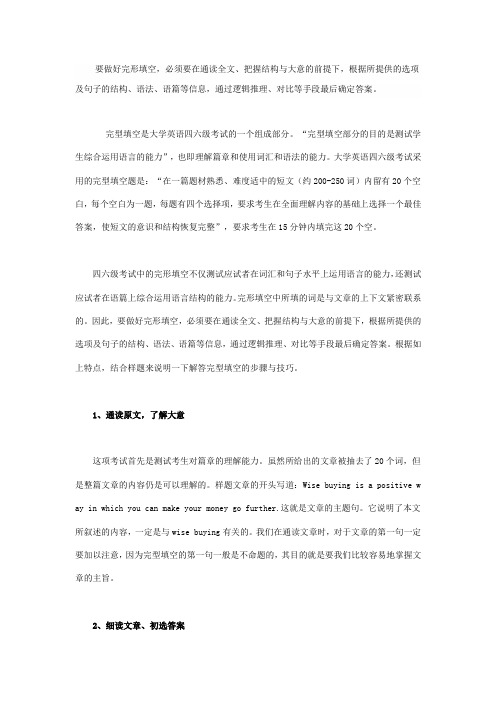
要做好完形填空,必须要在通读全文、把握结构与大意的前提下,根据所提供的选项及句子的结构、语法、语篇等信息,通过逻辑推理、对比等手段最后确定答案。
完型填空是大学英语四六级考试的一个组成部分。
“完型填空部分的目的是测试学生综合运用语言的能力”,也即理解篇章和使用词汇和语法的能力。
大学英语四六级考试采用的完型填空题是:“在一篇题材熟悉、难度适中的短文(约200-250词)内留有20个空白,每个空白为一题,每题有四个选择项,要求考生在全面理解内容的基础上选择一个最佳答案,使短文的意识和结构恢复完整”,要求考生在15分钟内填完这20个空。
四六级考试中的完形填空不仅测试应试者在词汇和句子水平上运用语言的能力,还测试应试者在语篇上综合运用语言结构的能力。
完形填空中所填的词是与文章的上下文紧密联系的。
因此,要做好完形填空,必须要在通读全文、把握结构与大意的前提下,根据所提供的选项及句子的结构、语法、语篇等信息,通过逻辑推理、对比等手段最后确定答案。
根据如上特点,结合样题来说明一下解答完型填空的步骤与技巧。
1、通读原文,了解大意这项考试首先是测试考生对篇章的理解能力。
虽然所给出的文章被抽去了20个词,但是整篇文章的内容仍是可以理解的。
样题文章的开头写道:Wise buying is a positive w ay in which you can make your money go further.这就是文章的主题句。
它说明了本文所叙述的内容,一定是与wise buying有关的。
我们在通读文章时,对于文章的第一句一定要加以注意,因为完型填空的第一句一般是不命题的,其目的就是要我们比较容易地掌握文章的主旨。
2、细读文章、初选答案完型填空综合了词汇、结构以及阅读理解部分的测试内容,一般包括动词、介词搭配,词汇辨析(包括形近词和意近词)、固定搭配以及语法结构等等。
(1)词汇辨析选项与选项之间构成形近词、意近词的关系。
(英语)英语完形填空题20套(带答案)及解析
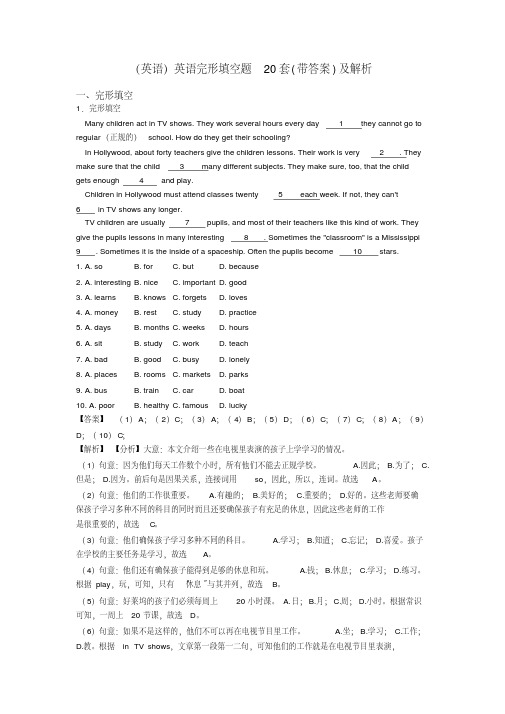
C. proud D. disappointed
6. A. anyone B. someone C. everyone D. no one
7. A. ran
B. flew
C. drove D. walked
8. A. How
B. Why
C. When D. Where
9. A. When
B. Since
14. A. Be careful B. Never mind C. Not bad D. You' re welcome
15. A. wish
B. report
C. speech D. suggestion
【答案】 ( 1)B;( 2)C;( 3) A;( 4) D;( 5)B;( 6) B;( 7) C;( 8) B;( 9)
A;( 10) D;( 11) D;( 12) A;( 13) C;( 14) C;( 15)A;
【解析】 【分析】主要讲了作者和家人去采摘蒲公英,并且请
Brigid 吃蒲公英。
( 1)句意:妈妈打开车门,我拿着一本书进入。
A.书包; B.书; C.菜单; D.花。根据后文
But I just hid in the book. 可知是一本书,故选 B。
( 2)句意:我的家乡是希腊,在那里蒲公英总是在菜单上。
A.曾经; B.从不; C.总是; D.
几乎不。在希腊人们总是吃蒲公英,所以蒲公英总是出现在菜单上,故选
C。
( 3)句意:每年春天为什么我不得不和家人采摘它们? 水。根据全文可知主要讲了作者和家人采摘蒲公英,故选
A.采摘; B.种植; C.观看; D.浇 A。
9 . Sometimes it is the inside of a spaceship. Often the pupils become 10 stars.
英语四级完型填空模拟试卷及答案
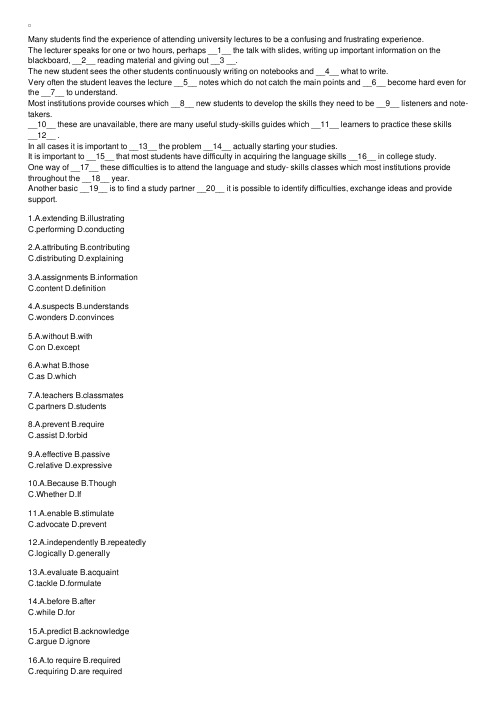
Many students find the experience of attending university lectures to be a confusing and frustrating experience.The lecturer speaks for one or two hours, perhaps __1__ the talk with slides, writing up important information on the blackboard, __2__ reading material and giving out __3 __.The new student sees the other students continuously writing on notebooks and __4__ what to write.Very often the student leaves the lecture __5__ notes which do not catch the main points and __6__ become hard even for the __7__ to understand.Most institutions provide courses which __8__ new students to develop the skills they need to be __9__ listeners and note-takers.__10__ these are unavailable, there are many useful study-skills guides which __11__ learners to practice these skills__12__ .In all cases it is important to __13__ the problem __14__ actually starting your studies.It is important to __15__ that most students have difficulty in acquiring the language skills __16__ in college study.One way of __17__ these difficulties is to attend the language and study- skills classes which most institutions provide throughout the __18__ year.Another basic __19__ is to find a study partner __20__ it is possible to identify difficulties, exchange ideas and provide support.1.A.extending B.illustratingC.performingD.conducting2.A.attributing B.contributingC.distributingD.explaining3.A.assignments rmationC.contentD.definition4.A.suspects B.understandsC.wondersD.convinces5.A.without B.withC.onD.except6.A.what B.thoseC.asD.which7.A.teachers B.classmatesC.partnersD.students8.A.prevent B.requireC.assistD.forbid9.A.effective B.passiveC.relativeD.expressive10.A.Because B.ThoughC.WhetherD.If11.A.enable B.stimulateC.advocateD.prevent12.A.independently B.repeatedlyC.logicallyD.generally13.A.evaluate B.acquaintC.tackleD.formulate14.A.before B.afterC.whileD.for15.A.predict B.acknowledgeC.argueD.ignore16.A.to require B.requiredC.requiringD.are required17.A.preventing B.withstandingC.sustainingD.overcoming18.A.average B.ordinaryC.normalD.academic19.A.statement B.strategyC.situationD.suggestion20.A.in that B.for whichC.with whomD.such as答案及解析:1.【答案】B【解析】将第1,2,3题通盘考虑。
全国英语六级考试完形填空模拟练习附答案
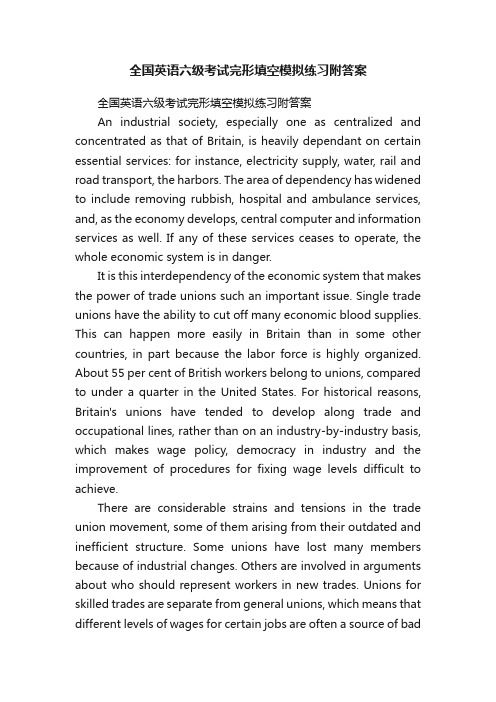
全国英语六级考试完形填空模拟练习附答案全国英语六级考试完形填空模拟练习附答案An industrial society, especially one as centralized and concentrated as that of Britain, is heavily dependant on certain essential services: for instance, electricity supply, water, rail and road transport, the harbors. The area of dependency has widened to include removing rubbish, hospital and ambulance services, and, as the economy develops, central computer and information services as well. If any of these services ceases to operate, the whole economic system is in danger.It is this interdependency of the economic system that makes the power of trade unions such an important issue. Single trade unions have the ability to cut off many economic blood supplies. This can happen more easily in Britain than in some other countries, in part because the labor force is highly organized. About 55 per cent of British workers belong to unions, compared to under a quarter in the United States. For historical reasons, Britain's unions have tended to develop along trade and occupational lines, rather than on an industry-by-industry basis, which makes wage policy, democracy in industry and the improvement of procedures for fixing wage levels difficult to achieve.There are considerable strains and tensions in the trade union movement, some of them arising from their outdated and inefficient structure. Some unions have lost many members because of industrial changes. Others are involved in arguments about who should represent workers in new trades. Unions for skilled trades are separate from general unions, which means that different levels of wages for certain jobs are often a source of badfeeling between unions. In traditional trades which are being pushed out of existence by advancing technologies, unions can fight for their members' disappearing jobs to the point where the jobs of other union's members are threatened or destroyed. The printing of newspapers both in the United States and in Britain has frequently been halted by the efforts of printers to hold on to their traditional highly-paid jobs.21. Why is the question of trade union power important in Britain?A. The economy is very much interdependent.B. Unions have been established a long time.C. There are more unions in Britain than elsewhere.D. There are many essential services.22. Because of their out-of-date organization some unions find it difficult to______.A. change as industries changeB. get new members to join themC. learn new technologiesD. bargain for high enough wages23. Disagreements arise between unions because some of themA. try to win over members of other unionsB. ignore agreementsC. protect their own members at the expense of othersD. take over other union's jobs24. It is difficult to improve the procedures for fixing wage levels because______.A. some industries have no unionsB. unions are not organized according to industriesC. only 55 per cent of workers belong to unionsD. some unions are too powerful25. Which of the following is NOT TRUE?A. There are strains and tensions in the trade union movement.B. Some unions have lost many members.C. Some unions exist in the outdated structure.D. A higher percentage of American workers belong to unions than that of British workers.参考答案21. A 22. A 23. C 24. B 25. D。
大学英语六级完形填空练习包括答案.docx
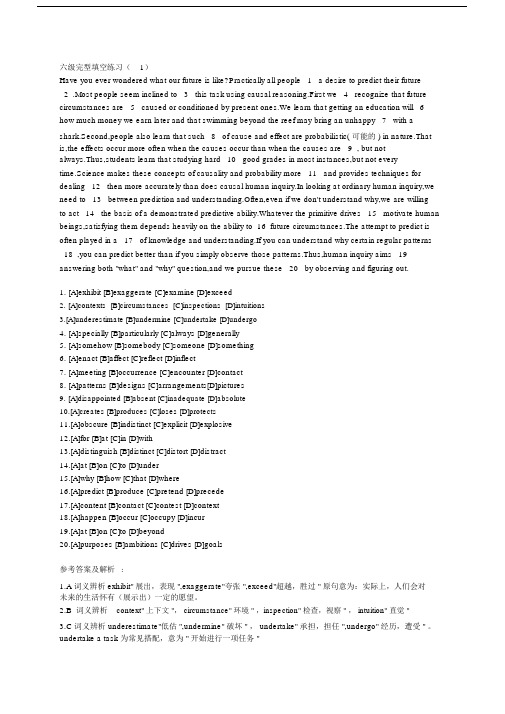
六级完型填空练习(1)Have you ever wondered what our future is like?Practically all people _1_ a desire to predict their future_2_.Most people seem inclined to _3_ this task using causal reasoning.First we _4_ recognize that future circumstances are _5_ caused or conditioned by present ones.We learn that getting an education will _6_ how much money we earn later and that swimming beyond the reef may bring an unhappy _7_ with a shark.Second,people also learn that such _8_ of cause and effect are probabilistic( 可能的 ) in nature.That is,the effects occur more often when the causes occur than when the causes are _9_, but notalways.Thus,students learn that studying hard _10_ good grades in most instances,but not everytime.Science makes these concepts of causality and probability more _11_ and provides techniques for dealing _12_ then more accurately than does causal human inquiry.In looking at ordinary human inquiry,we need to _13_ between prediction and understanding.Often,even if we don't understand why,we are willingto act _14_ the basis of a demonstrated predictive ability.Whatever the primitive drives _15_ motivate human beings,satisfying them depends heavily on the ability to_16_future circumstances.The attempt to predict is often played in a _17_ of knowledge and understanding.If you can understand why certain regular patterns _18_,you can predict better than if you simply observe those patterns.Thus,human inquiry aims _19_ answering both "what" and "why" question,and we pursue these _20_ by observing and figuring out.1.[A]exhibit [B]exaggerate [C]examine [D]exceed2.[A]contexts [B]circumstances [C]inspections [D]intuitions3.[A]underestimate [B]undermine [C]undertake [D]undergo4.[A]specially [B]particularly [C]always [D]generally5.[A]somehow [B]somebody [C]someone [D]something6.[A]enact [B]affect [C]reflect [D]inflect7.[A]meeting [B]occurrence [C]encounter [D]contact8.[A]patterns [B]designs [C]arrangements[D]pictures9.[A]disappointed [B]absent [C]inadequate [D]absolute10.[A]creates [B]produces [C]loses [D]protects11.[A]obscure [B]indistinct [C]explicit [D]explosive12.[A]for [B]at [C]in [D]with13.[A]distinguish [B]distinct [C]distort [D]distract14.[A]at [B]on [C]to [D]under15.[A]why [B]how [C]that [D]where16.[A]predict [B]produce [C]pretend [D]precede17.[A]content [B]contact [C]contest [D]context18.[A]happen [B]occur [C]occupy [D]incur19.[A]at [B]on [C]to [D]beyond20.[A]purposes [B]ambitions [C]drives [D]goals参考答案及解析:1.A 词义辨析 exhibit" 展出,表现 ",exaggerate"夸张 ",exceed"超越,胜过 " 原句意为:实际上,人们会对未来的生活怀有(展示出)一定的愿望。
全国英语六级阅读理解完形填空模拟练习

全国英语六级阅读理解完形填空模拟练习全国英语六级阅读理解完形填空模拟练习Are some people born clever, and others born stupid? Or is intelligence developed by our environment and our experiences? Strangely enough, the answer to both these questions is yes. To some extent our intelligence is given us at birth, and no amount of special education can make a genius out of a child born with low intelligence. On the other hand, a child who lives in a boring environment will develop his intelligence less than one who lives in rich and varied surroundings. Thus the limits of a person's intelligence are fixed at birth, but whether or not he reaches those limits will depend on his environment. This view, now held by most experts, can be supported in a number of ways.It is easy to show that intelligence is to some extent something we are born with. The closer the blood relationship between two people, the closer they are likely to be in intelligence. Thus if we take two unrelated people at random(任意的') from the population,it is likely that their degrees of intelligence will be completely different. If on the other hand we take two identical (完全相同的) twins they will very likely be as intelligent as each other. Relations like brothers and sisters, parents and children, usually have similar intelligence, and this clearly suggests that intelligence depends on birth.Imagine now that we take two identical twins and put them in different environments. We might send one, for example, to a university and the other to a factory where the work is boring. We would soon find differences in intelligence developing, and this indicates that environment as well as birth playsa part. This conclusion is also suggested by the fact that people who live in close contact with each other, but who are not related at all, are likely to have similar degrees of intelligence.26. Which of these sentences best describes the writer's point in Paragraph 1?A. To some extent, intelligence is given at birth.B. Intelligence is developed by the environment.C. Some people are born clever and others born stupid.D. Intelligence is fixed at birth, but is developed by the environment.27. It is suggested in this passage that_______.A. unrelated people are not likely to have different intelligenceB. close relations usually have similar intelligenceC. the closer the blood relationship between people, the more different they are likely to be in intelligenceD. people who live in close contact with each other are not likely to have similar degrees of intelligence28. Brothers and sisters are likely to_______.A. have similar intelligenceB. have different intelligenceC. go to the same universityD. go to the same factory29. In Paragraph 1, the word "surroundings" means_______.A. intelligenceB. lifeC. environmentsD. housing30. The best title for this article would be_______.A. On IntelligenceB. What Intelligence MeansC. We Are Born with IntelligenceD. Environment Plays a Part in Developing Intelligence参考答案26. D 27. B 28. A 29. C 30. A。
- 1、下载文档前请自行甄别文档内容的完整性,平台不提供额外的编辑、内容补充、找答案等附加服务。
- 2、"仅部分预览"的文档,不可在线预览部分如存在完整性等问题,可反馈申请退款(可完整预览的文档不适用该条件!)。
- 3、如文档侵犯您的权益,请联系客服反馈,我们会尽快为您处理(人工客服工作时间:9:00-18:30)。
洛基英语,中国在线英语教育领导品牌第七篇Shopping habits in the United States have changed greatly in the last quarter of the 20th century. 1 in the 1900s most American towns and cities had a Main Street. Main Street was always in the heart of a town. This street was 2 on both sides with many 3 businesses. Here, shoppers walked into stores to look at all sorts of merchandise: clothing, furniture, hardware, groceries. 4 ,some shops offered 5 .These shops included drugstores, restaurants, shoe-repair stores, and barber or hairdressing shops. 6 in the 1950s, a change began to 7 .Too many automobiles had crowded into Main Street 8 too few parking places were 9 shoppers. Because the streets were crowded, merchants began to look with interest at the open spaces 10 the city limits. Open space is what their car-driving customers needed. And open space is what they got 11 the first shopping centre was built. Shopping centres, or rather malls, 12 as a collection of small new stores 13 crowded city centres. 14 by hundreds of free parking space, customers were drawn away from 15 areas to outlying malls. And the growing 16 of shopping centres led 17 to the building of bigger and better stocked stores. 18 the late 1970s,many shopping malls had almost developed into small cities themselves. In addition to providing the 19 of one stop shopping, malls were transformed into landscaped parks, 20 benches, fountains, and outdoor entertainment.1. A. As early as B.Early C.Early as D.Earlier2. A.built B.designed C.intented D.lined3. A.varied B.various C.sorted D.mixed up4. A. Apart from B.However C.In addition D. As well5. A.medical care B.food C.cosmetics D.services6. A.suddenly B. Abruptly C. Contrarily D. But7. A.be taking place B.take place C.be taken place D.have taken place8. A.while B.yet C.though D.and then9. A.available for B.available to ed by D.ready for10. A.over B.from C.out of D.outside11. A.when B.while C.since D.then12. A.started B.founded C.set up anized13. A.out of B.away from C.next to D.near14. A. Attracted B.Surprised C. Delighted D.Enjoyed15. A.inner B.central C.shopping D.downtown16. A.distinction B.fame C.popularity D.liking17. A.on B.in turn C.by turns D.further18. A. By B. During C.In D.Towards19. A.cheapness B.readiness C.convenience D.handiness20. A.because of B.and C.with D.provided第七篇答案+解说:1.【答案】B【解析】as early as的意思为“同……一样早”, early是副词,“早期”的意思,earlier是比较级“较早”的意思。
2.【答案】D【解析】本句的意思是“街道的两旁排列着很多各种各样的商店”,build的意思是“建造,修建”,design的意思是“设计”,intend“意思是“打算”,line是“沿……排列”的意思。
3.【答案】B【解析】varied是“变化多端”的意思,various为“各种各样的”,sorted意为“分类的”,mixed up意为“困惑的,迷惘的,不适应社会的”。
本句意为“各种各样的商店”。
4.【答案】C【解析】本句的意思是“除了各种各样的商店销售各种各样的商品之外,有些商店还提供服务”,apart from意为“除此之外”,后必须接名词或动名词,however 是连词“然而”的意思,in addition可单独使用,意为“除此之外”,as well用在句末。
5.【答案】D【解析】medical care意为“医疗护理”。
food是“食物”,cosmetic是“化妆品”,service是“服务”,根据上题意思,service一词放在这里最合适。
6.【答案】D【解析】本句的意思是“在五十年代,情况发生了变化”,有转折的意思。
suddenly 和abruptly都是“突然”的意思,contrarily指“相反地”,but是“但是”的意思,表转折。
7.【答案】B【解析】take place只有主动语态,故可排除C,而begin to后应接动词不定式,只有take place“发生”可用。
8.【答案】A【解析】此句中太多的汽车和太少的停车场有相对比较的意思,while是连词,有“而,却”的意思,表比较。
yet“然而”,表转折,though“尽管,虽然”,表让步。
9.【答案】B【解析】be available to sb.为固定搭配,意为“对某人来说可用的,可得到的”,本句意为“顾客可用的停车场地”,故选B。
10.【答案】D【解析】本句意为“商人们开始对城市界限以外的开阔地感兴趣”,out of表示“……的外面”而outside指“超过某一个界限,范围等”。
1.【答案】A【解析】这里是一个时间状语从句。
因此用when(在……时候)。
while指“在……期间”;since表示“自从”,主句一般用完成时。
12.【答案】A【解析】本句的意思是“购物中心是从聚集一些小的店铺开始的”,只有started as有此意。
13.【答案】B【解析】本句意为“远离拥挤的市中心”, out of指“在……之外”,away from 表示距离,“远离”,next to指“靠近,下一个”,near是“近”的意思。
14.【答案】A【解析】本句意为“被……所吸引”,surprise意为“使……惊奇”,delight意为“使……喜悦”,enjoy意为“欣赏,喜爱”。
15.【答案】D【解析】本句意为“顾客从市区被吸引到城市以外的商业中心”,只有downtown “市区”符合此意。
16.【答案】C【解析】本句意为“这些购物中心越来越大的名气反过来导致了更大,设备更好的商店的建成”。
distinction声望;fame卓越,好名声;popularity名气很大,知名度很高;liking喜爱,喜好。
故选C。
17.【答案】B【解析】根据上题解释,in turn应为“依次”的意思,引申为“反过来”。
18.【答案】A【解析】在这四个选项中,只有by所组成的时间状语与完成时连用,意为“到……为止”,其他三个选项均被排除。
19.【答案】C【解析】这里convenience与providing组成短语“提供方便,便利”,符合上下文义。
20.【答案】C【解析】介词with在这里的意思是“带有”,本句意为“商业街被变成了带有长椅、喷泉及户外娱乐的风景优美的公园”。
“成千上万人疯狂下载。
更多价值连城的绝密英语学习资料,洛基内部秘密英语,技巧,策略请在网上申请报名”。
